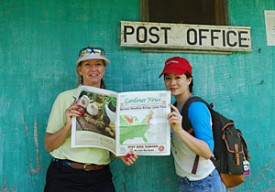SEBS Senior Jordan Mason tells tells the story of her own global reach.

Jordan weeding with students from the Silver Creek Roman Catholic School.
March 14, 2012, I am standing in a little garden literally in the backyard of Silver Creek Roman Catholic Primary School (SCRCPS) in the Toledo District of Belize – among the most remote and undeveloped area of the Central American nation– with beads of sweat streaming down my forehead. Fifteen students barely 10 years old are all around me as we spread rice trash, or fertilizer made from rice hulls, around newly sown seeds. My new friend, Isabel, turns to me and asks, “Do you like Chinese lettuce, miss? It is very good for you, miss.”
For Spring Break, my Rutgers University class, known as International Relations, had a once in a lifetime opportunity to partake in an educational intensive trip to Belize over our Spring Break. This being said, we found ourselves at SCRCPS to learn more about Garden- Based Agriculture for Toledo’s Environment (GATE), which focuses on being a model of local sustainability on organic school gardens like SCRCPS. When I asked Abib Palma, the project staff extension officer of GATE, why organic farming was so important, he replied with 3 solid reasons, “The environment, food security and nutrition, and education.”
Palma’s answer might seem obvious, but what we must remember is that he is speaking on behalf of Belize. One of the major issues with traditional farming is the clearing of the rainforest for more farms because of soil erosion. In organic farming, the soil remains more nutrient dense through methods of composted fertilizers and chemical free pesticides. As a result, the land may be utilized longer and fewer trees have to be cut. Also, because organic farming practices the use of chemical- free pesticides, the threat of harmful chemicals running off into natural water sources is eliminated.

SAS student Gisela Moore (right) sifting organic fertilizers with young students in Belize.
Along with the environment, organic farming is also beneficial to the students. GATE encourages the students to not only plant the produce, but to eat it as well. Since the Toledo District has the highest incidences of malnutrition in Belize, these gardens are an important staple in the schools. As a result, the fruits and vegetables planted decrease malnutrition and poverty levels by increasing the consumption of nutrient rich foods. According to Mark Miller (whom I had to pleasure of meet during my trip), the former president and current member of Punta Gorda’s (PG) Rotary Club in Belize, GATE and the PG Rotary Club have partnered up to support the Toledo School Feeding Program. So far, 13 of the 22 GATE schools use their organic gardens as a means of providing nutritious meals and snacks for their students.
Perhaps the most important concept learned through organic farming in Belize is the value of education. The teachers are able to incorporate the environment into their lessons, whether it is about nutrition, or even math. For example, how many cucumbers do we have? How much do they weigh on the scale? Students are learning when they do not even realize it, and perhaps that is the key to education.

(l. to r.) Mary Nikola and Jordan Mason reading the New Jersey Gardener News in front of the post office in Barranco Village in the Toledo District of Belize.
As I wipe the sweat from my eyes with my already soaked shirt, I also realize that I have learned a lesson in this little organic garden. By simply living in a way that respects Mother Nature, our lives can be more fulfilling today, and just as plentiful in the future. Without organic farming, perhaps the most sustainable form of agriculture, many opportunities are missed and wasted. We learn to maintain healthy farms for the next generations, giving future children food to live on, and teaching them life skills that they will use forever by passing them on to their children.

